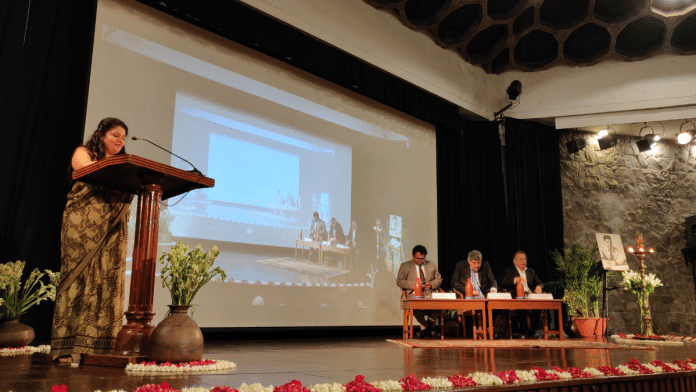Former Delhi High Court Chief Justice Ajit Prakash Shah wants to turn the clock back and “return to history”. He mentioned it at a recent memorial lecture in Delhi where he expressed his discontent with today’s India and warned that the country is becoming an “elected autocracy”. The “next stage of the Hindutva movement, the birthing of the Hindu Rashtra, is firmly in the works,” he added.
However, in a revelation that surprised audience members, Shah went on to mention that his grandfather was the president of the Hindu Mahasabha in the 1940s. He revealed that the earliest literature he read as a young boy in school was VD Savarkar’s writings. He “fell in love with his initial poetry, though his later poems became highly Sanskritised and tedious to read,” the judge recalled.
The ex-chairman of the Law Commission of India was speaking at the 25th DS Borker Memorial Lecture on ‘My Vision of India: 2047 AD’ at Delhi’s India International Centre (IIC). The event was chaired by Supreme Court judge Sanjay Kishan Kaul; the introductory note was delivered by Anup Surendranath, professor of law and executive director of Project 39A, a criminal justice programme at the National Law University Delhi (NLUD).
After presenting a rather grim picture of the country’s current reality, Shah’s “vision of India of 2047” came only toward the fag end of his 50-minute lecture. He said he would “return, unhesitatingly, to history” and wants a reversal of the “situation we have found ourselves in today”. It was almost a plea for the return of Gandhi. “The universal values that have survived since time immemorial, and that will survive for time to come — the values of truth, non-violence, compassion, and kindness — these are what must define my India of 2047. These values must guide the government and society,” the judge said.
Also read: Caste pride is everywhere in Tamil Nadu’s Tirunelveli. Schools are the new scene of crime
But before all the nostalgia, Shah mentioned some of the biggest names and events in history and contemporary times. Adolf Hitler, Jawaharlal Nehru, Rabindranath Tagore, the 1975 Emergency, 2023 Nuh violence, NCERT syllabus change, bulldozer politics, hate speech, resurgence of communalism, failing institutions, collapse of the Right to Information (RTI) mechanism, intelligence agencies being deployed as “arms of government”, lack of independent media– you name it.
Shah even mentioned Chandrayaan-3. “Like millions of Indians, my wife and I cried with joy when Chandrayaan-3 landed on the moon,” the judge said. Although it was an “emotional moment for all of us”, he said, Shah was “deeply troubled by many other things”.
The former judge was more concerned about India’s democratic journey.
“If you look deeper, it seems to me that India’s society and institutions are in a state of unprecedented disruption, in fact, a crisis. Some argue that democracy here is dying a slow death,” he said. Quoting legal academic Tarunabh Khaitan, Shah said that the Constitution “is being killed by a thousand cuts”.
And in his usual candid manner, the judge pointed out what led up to the country’s current state. “Democratic institutions and accountability mechanisms have been neutralised or compromised,” he said, adding that there has been “an insidious harvesting of a culture of hate, leading to active theatres of violence”.
So where did India go wrong? And how?
For Shah, the answer could be arrived at by looking at 1947 and 2047 — by first recalling what the idea of India was at the time of Independence and then looking into what India’s future could be 100 years after it. That explained his nostalgia for India’s past.
Also read: 12,000 yrs, 101 chapters and one question—How many pasts does India have?
1947 vs 2047
The DS Borker Memorial Lecture is held every year in memory of DS Borker, a former civil servant and public sector administrator. The first lecture was conducted 1999 and on 24 August every year, IIC invites a speaker to talk about their vision of India for 2047.
This year, Justice Shah presented a backdrop of the making of the Constitution and how the thinkers at the time set out to define their idea of free India and nationalism.
“The word ‘nationalism’ encompasses many meanings. It can mean progressive, revolutionary, pro-people, or even regressive or jingoistic nationalism. Hitler’s nationalism, different from Gandhi’s, was a kind of nationalism, nevertheless,” Shah said.
And over the decades, perhaps India lost some of its original conceptions of nationhood and democracy — the contemporary reality, according to Shah, is dismally narrow.
“Today, India celebrates, at best, only a political democracy. We forget the other dimensions of the true democracy (BR) Ambedkar had hoped India would have — of economic and social democracy,” the judge said.
Also read: Raj Bhavans aren’t just about pomp, privilege but power too. They are now BJP war rooms
The rise of Hindutva
Any discussion on Indian politics today seems to be incomplete without a mention of Hindutva. At IIC, Shah spoke about how the idea of Hindutva challenges the Hindu faith itself, which is actually liberal, tolerant, and generous. “Why Hindu society is largely silent on what is being perpetrated in the name of their religion against the minorities is a question many of us might as well ask today,” Shah said.
And how did the “elected autocracy” come about? Shah asserted that though the Bharatiya Janata Party (BJP) rose to power legitimately through elections, it was “acting along starkly authoritarian lines”. Executive dominance that set in during Emergency is “thriving”. The precipitating fall in public trust for formal institutions, including courts, Parliament, police, and civilian bureaucracy, started in that decade.
“This was when the Indian playbook for authoritarianism was first written, a terrifying trailer for times to come. Amity in society deteriorated, and fissures along religious and caste lines deepened,” Shah noted.
(Edited by Humra Laeeq)






